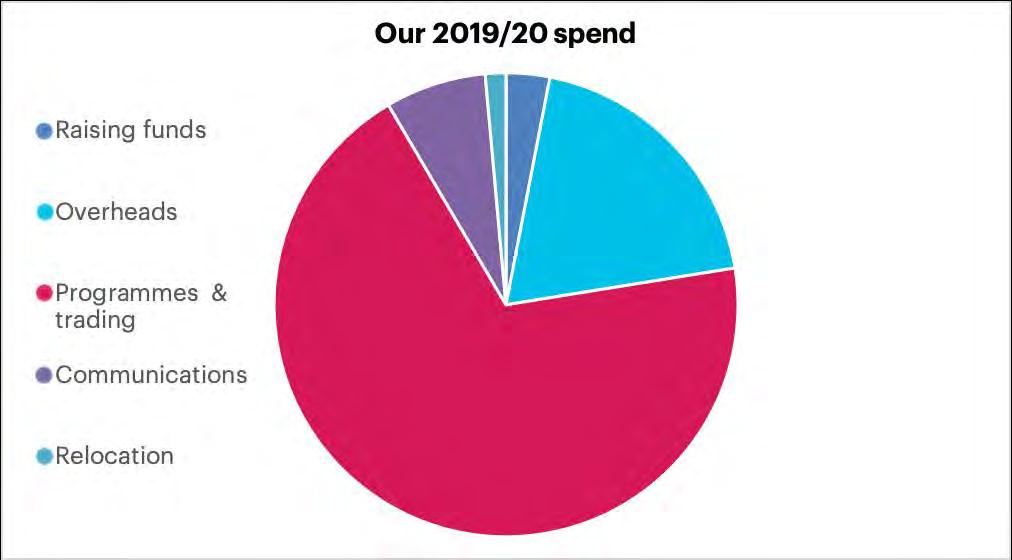
8 minute read
COVID-19: impact on our activities and plans for future periods
In March 2020, we responded to the Coronavirus control measures by implementing new procedures and guidelines for our staff to work effectively from home. We did not furlough any staff nor have we made redundancies.
As the support body for dance, the sector reached out to us in greatly increased numbers for information on the disruption caused by COVID-19. We communicated with e-bulletins, social media updates and speaking with our community on a range of online meetings held with dance groups and webinars on the phased return of dance. We quickly moved our face-to-face activities online.
Young Creatives 2020 was launched in February at Dance Hub Birmingham for 8 selected participants. The face-to-face workshops and showcase in May and June brought participants together online for creative development, rehearsal and a filming day led by Rhian Robbins. The creative work was edited into a short film that was premiered at U.Dance Digital Festival 2020.
U.Dance Festival 2020, due to be held at Tramway, Glasgow 17 – 19 July 2020, was relaunched as U.Dance Digital Festival 2020. It was successfully presented online 17 – 19 July 2020 and greatly surpassed expectations
Advocacy has grown stronger with the Senior Management Team gathering information from our dance colleagues through a survey and participation in group meetings to highlight key issues for the dance sector in discussions with DCMS and the devolved administrations of Northern Ireland, Scotland and Wales on COVID-19 recovery needs for the sector and on education to Ofqual, AfPE, CYP Board and the Council for Subject Associations.
We continue to act as the Secretariat for the APPDG and we will continue to advocate loudly for the UK dance sector across a range of issues, including the post transition period with the EU, at an unprecedented time.
One Dance UK Awards 2020 opened for nominations in March 2020 and closed in June 2020, with similarly high nominations as in 2019. Their will be a digital ceremony held this year to honour our nominees and awardees.

Members: We offered a free 3-month membership to support freelancers from April to June 2020 and signed up 200 new members. There was a 6% decline in membership income due to the Coronavirus measures in March 2020 where many of our annual individual renewals occur in that month. We experienced very few renewals in March 2020, with suppressed but growing activity after the year-end.
Fundraising activities; Our main grant application for 2020/21 of £75,000 to support U.Dance 2020 at the Tramway, Glasgow was declined due to lockdown. The festival was successfully moved online with net costs of £4,000 due to lower costs of digital presentation and higher than expected sponsorships. The net cost was significantly lower than previously budgeted.
We maintained our drive to increase diversity of participants and dance forms. Our Dance Ambassadors voluntarily supported our U.Dance 2020 digital festival with guided and protected opportunities to introduce themselves and take leadership, with their consent.
CPD talks for dance teachers increased online delivery from April 2020 as a paying service. Healthier Dancer Talks are provided free online, with twice weekly webinars from May 2020 on returning to dance, physical and mental health and wellbeing. HDP and NIDMS webinars receive attendances ranging from 200 to 700 attendees per session.
Dance On was suspended due to COVID-19 measures in March 2020 and resumed online in August 2020 on a trial basis.
A social media group has been implemented for DAD practitioners and companies. HOTFOOT Online magazine was published in May 2020 with the second due in Autumn 2020. Our Action Plan for the DAD sector will be hosted online until December 2020.

We expect to meet our grant conditions for Paul Hamlyn Foundation in the next financial year and receive our next Sport England tranche in May 2020.
With full staffing in the Membership & Business Development team, we are focused on sponsorship and partnering of our programmes as they move online. They are supported by significantly higher website and social media traffic than before. We have created information packages on our increased digital profile for sponsors, advertisers and Trusts and Foundations and have seen early success.
With thanks to our former Chair: In June 2020, our former Chair stepped down after 4 years upon completing her stewardship aims of streamlined operations of the merged companies and relocation to Birmingham. We are immensely grateful to Sue Wyatt for her generosity, leadership and support of the Trustees and staff.
Financial Review
We are a Sector Support Organisation in Arts Council England’s National Portfolio of Organisations. Arts Council England is our largest funder with funding used to meet our programme of activities and contribute to core costs.

We incurred relocation costs of £16,874 ending 2 years of relocation planning with redundancy payments expensed in 2018/19.
We achieved a surplus of £5,974 on unrestricted activities.
Our restricted funds activities continue to show the timing difference of funds received in previous years and drawdowns in 2019/20. No restricted fund is in deficit at the yearend.
Principal Risks and Risk Management
Our Trustees have a risk management strategy which comprises:
• a biannual review of the principal risks and uncertainties that the charity faces;
• the establishment of policies, systems and procedures to mitigate those risks identified in the biannual review;
• the implementation of procedures designed to minimise or manage any potential impact on the charity should those risks materialise
This work has identified that meeting fundraising targets and the impact of COVID-19 measures are the major financial risks we face to ensure we serve beneficiaries and maintain financial resilience.
The risks have been mitigated through:
• adjusting our business model, budgets and cashflows for the next 2 financial years, in response to Coronavirus measures, with lower, budgeted, earned income matched to equally lower operating costs whilst we grow online delivery, communication and advocacy for the dance sector;
• maintaining our full staff without redundancies;
• continued funding from Arts Council England as principal NPO funder and Paul Hamlyn Foundation to 31 March 2022, contributing to core and educational costs based on funding conditions that we are certain will be met
We regularly review the fundraising achieved against targets to make any adjustments to our activities should the need arise.
Reserves and reserves policy
COVID - 19 Impact: We have made significant reductions to budgeted earned income for the next financial year while equally reducing projected programme costs through quickly moving programmes online. Our core costs will be met by our NPO grant with Arts Council England. We expect to cover our operating costs to 31 March 2021 and meet our planned activities for beneficiaries.
The Trustees are satisfied that One Dance UK is a going concern at the time of signing the accounts as:
• core funding (£750,000 per annum) is expected to continue as SSO within Arts Council England’s National Portfolio of Organisations to March 2022 and (£40,000) Paul Hamlyn Foundation to March 2022;
• we have adjusted our future budgets and cashflow projections to anticipate lower projected earned income along with significantly lower programme costs through switching to online delivery. This has already occurred for U.Dance 2020 and Young Creatives in the next financial year. We expect to cover our operating costs to March 2021 and March 2022;
• our unrestricted reserves are at the appropriate level required by our Trustees and include consideration of the impact of Coronavirus measures
The Trustees of the charity have set the unrestricted reserves policy at a level so that there are sufficient funds to cover:
• 3 months of operations in the event of any unplanned closure and its impact on beneficiaries, staff and other financial commitments;
• fluctuations in annual projected income; and
• foreseeable financial commitments
At the year end, we hold £359,155 in unrestricted reserves (£353,181 at 31 March 2019) that is appropriate for the level of reserves identified by the trustees given their plans for the future activities of the charity that also include the impact of Coronavirus measures.
No restricted fund is in deficit. The Charity holds £9,432 at 31 March 2020 (£50,053 at 31 March 2019) in restricted funds for specific projects

One Dance UK is a company limited by guarantee governed by its Memorandum and Articles of Association dated 11 May 1994. It is registered as a charity with the Charity Commission. Anyone over the age of 18 can become a member of the Company and there are currently 1,354 members, each of whom agrees to contribute £1 in the event of the charity winding up.
Appointment of Trustees
As set out in the Articles of Association the Trustees are appointed by members of One Dance UK at the Annual General Meeting (AGM) or by postal vote. The Trustees shall retire from office at the fourth AGM following the AGM at which his or her current term commenced. Any Trustee who has served 2 consecutive terms can only be re-appointed after a one-year break from office.
All members are circulated with invitations to nominate Trustees prior to the AGM advising them of the retiring Trustees and requesting nominations for the AGM. If a vacancy on the Board occurs between AGMs the Board may co-opt a person to serve until the next AGM when such person may stand for election. If the Trustees determine that the Board is lacking any particular skill then the Trustees may appoint an additional 3 Trustees at any time with a term not exceeding 4 years from the AGM that their appointment was accepted by members.
Trustee induction and training
New Trustees are required to have an induction into all key areas of One Dance UK’s work and its constitution, and to be briefed on their legal obligations prior to their first Board meeting. They must sign a ‘fit and proper person’ declaration, conflict of interest memorandum and are provided with good governance documentation, financial and management accounts, the Memorandum and Articles of Association and latest business plan.
Organisation
The Board of Trustees, which can have up to 20 members, is responsible for decisions regarding policy and overall direction. The Board monitors progress of programmes and initiatives, finance and other developments at quarterly meetings and reports to the membership at the AGM. There are subcommittees covering relocation and finance that meet regularly.
A Chief Executive is appointed by the Trustees to manage the day-to-day operations of the charity. To facilitate effective operations, the Chief Executive has delegated authority, within terms of delegation approved by the Trustees, for operational matters including finance, employment, project and programme delivery and fundraising.


Remuneration of the Executive and Senior Management Team
Our remuneration to our Executive and Senior Management Team is based on retaining and recruiting talented individuals with the knowledge, skills and experience required for each job role to meet our ambitious programmes at the market rate for comparable roles in comparable organisations.
Senior Management Team
Chief Executive: Andrew Hurst


Related Parties And Umbrella Networks
charity. Any connection between a Trustee or senior manager of the charity with a related party must be disclosed to the full board of Trustees in the same way as any other contractual relationship with a related party. In the current year no such related party transactions were reported.
The charity is a paying member of umbrella groups Creative Industries Federation and National Dance Network. The charity is also a non-paying participant of other umbrella groups that are What Next?, Culture Counts and the Cultural Learning Alliance. Our membership and affiliations do not impact on the operating policies adopted by the charity.
Coronavirus control measures on our wider network have not impacted our operations.



